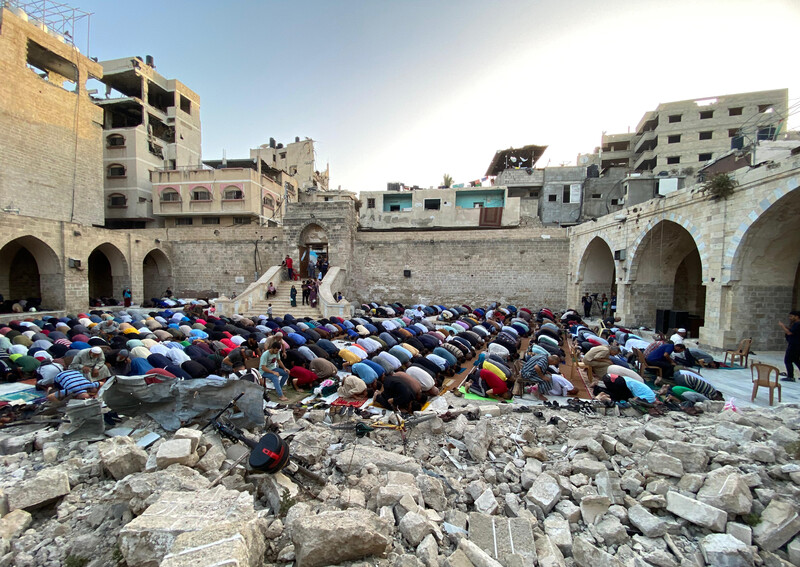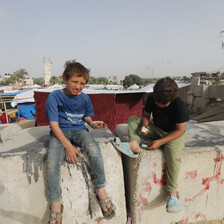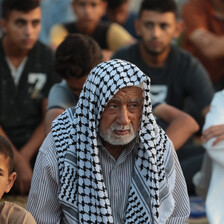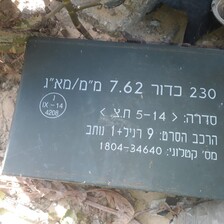The Electronic Intifada 17 June 2024

Prayers to mark Eid al-Adha are being held amid the rubble of mosques damaged or destroyed by Israel.
APA imagesEid al-Adha should be a time of joy.
This year the holiday takes place amid a genocide that has been inflicted on Gaza for more than eight months. That is a bitter pill to swallow.
We crave the simple pleasures of Eid: the laughter of children, the sweet scent of traditional treats, the peaceful atmosphere of prayer.
These human rights now seem out of reach.
Our children deserve happiness. They should be carefree, like kids everywhere.
What is our crime?
Being born in Gaza?
Do we not have the right to live without fear of destruction and death in our own homeland?
We have been trapped in a cycle of hardship, facing one devastating blow after another.
The only question we now ask is: When will we find peace?
Eid al-Adha should give Gaza’s people the chance to escape the confines of their war-torn homeland and join millions of Muslims around the world on the pilgrimage to Mecca.
This year their dreams have been crushed. The Rafah crossing – the only exit from this prison – has been closed.
It is as if people are stuck in a never-ending loop, yearning to break free but finding no way out.
Over the past eight months, we have lost people in their tens of thousands. They departed this world without the basic necessities of life: food, clean water, financial security.
Gaza’s streets are scarred by the brutal reality of war.
The sight of burned bodies is all too common. The rubble of destroyed buildings is everywhere.
In Gaza this year, Eid al-Adha is not about sacrificing animals. Human beings – mothers, children, entire families – have been slaughtered.
The once vibrant streets are now silent and desolate. They are devoid of the laughter and playful energy of children.
Daunting task of survival
Israel’s genocidal war has ravaged the very fabric of childhood, leaving sadness and despair in its stead.
Gone are the days when children would excitedly accompany their parents to markets, browsing the new clothes and toys.
Now, children beg their parents for a glimmer of normalcy amid the chaos.
“I want a toy,” a tearful girl tells her father. “Bring me chocolates and sweets.”
Amid the ruins, children cling to cherished traditions, asking their mothers to bake cookies – called kaak – as if such simple pleasures could momentarily ease the pain.
This Eid al-Adha, children look pale and emaciated as they gaze on what remains of their old playgrounds.
Children are consumed by the daunting task of survival. Their ears are constantly assaulted by the deafening sounds of missiles, drones and other warplanes.
Families usually prepare for Eid al-Adha by decorating their homes. Every corner is spruced up to make it feel warm and welcoming.
This year, those homes which are still habitable are bare and uninviting.
Families and friends have been forced to abandon the custom of visiting one another at Eid. The reality of war and occupation has made that impossible.
Instead, people huddle together in their makeshift shelters, trying to escape the constant barrage of gunfire and bombs.
Some try to find solace in brief moments of rest. Others wander the desolate streets, searching for scraps of food.
Restaurants are empty and silent, their doors padlocked.
There is no magic or enchantment at Eid al-Adha this year.
Gaza’s people are despondent. Yet I am confident that their spirits are indomitable.
Once this horrific chapter ends, people will emerge with a fierce determination to reclaim their homeland and their dignity and to build a brighter future.
Eman Alhaj Ali is a writer and translator based in Gaza.





